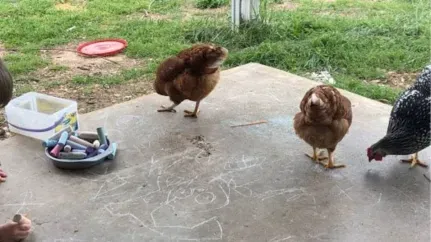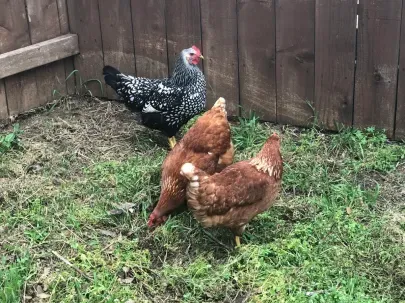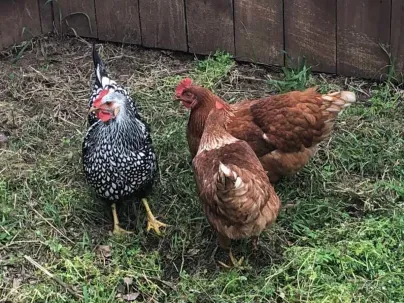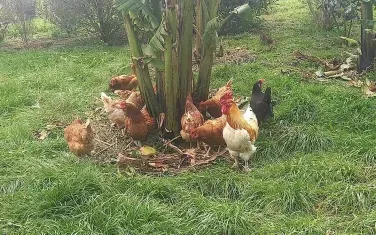The Pros and Cons of Keeping Pet Chickens in the House
So, you’re thinking about keeping pet chickens in your house?
Well, before you start envisioning fresh eggs every morning and adorable feathered friends roaming around your living room, let’s take a moment to discuss the pros and cons.
On one hand, having chickens in the house can be an excellent source of entertainment and companionship, not to mention the potential for a constant supply of farm-fresh eggs.
On the other hand, you might find yourself dealing with a whole lot of feathers, clucking noises, and unexpected messes.
Get ready to weigh the pros and cons of this unconventional pet ownership adventure!
This image is property of images.saymedia-content.com.
Health Benefits
Reduced Stress Levels
Keeping pet chickens in the house can have numerous health benefits, starting with reduced stress levels.
Watching these curious creatures go about their daily activities can be incredibly therapeutic and calming.
Whether it’s observing them scratch around in the backyard or simply listening to their gentle clucking, having pet chickens can help you unwind after a long day.
Therapeutic Effects
In addition to reducing stress, interacting with pet chickens can provide therapeutic effects.
Engaging with these feathered friends can promote feelings of happiness and contentment. Taking time to bond with your chickens can be a great way to relax and find joy in simple activities.
Not to mention, the soft, soothing sounds of their clucks can create a peaceful atmosphere and help you destress.
Fresh Eggs
One of the significant benefits of keeping pet chickens in the house is the access to fresh eggs.
There is nothing quite like waking up in the morning and gathering eggs for your breakfast right from your backyard.
Not only do the eggs taste better because they are fresher, but you also know exactly where they came from and how the chickens were kept.
This direct connection to your food can provide a sense of fulfillment and satisfaction.
Physical Exercise
Believe it or not, owning pet chickens can also be a great way to get some exercise. From setting up their coop to maintaining their living space, there are plenty of physical tasks involved.
Whether it’s cleaning the coop, feeding and watering the chickens, or even simply walking around the yard to check on them, having pet chickens can encourage you to get up and move.
This physical activity can contribute to better overall health and well-being.
Environmental Impact
Reduced Carbon Footprint
Keeping pet chickens in the house can have a positive environmental impact by reducing your carbon footprint.
Eggs from chickens you raise at home do not need to be transported from a commercial farm to a store, saving on transportation emissions.
Additionally, chicken waste can be composted and used as fertilizer, further reducing waste and reliance on synthetic fertilizers.
Natural Pest Control
Another environmental benefit of having pet chickens is their natural pest control abilities.
Chickens are excellent at foraging for insects, such as beetles, slugs, and snails, which can harm your garden. By allowing them access to your yard, you can limit the need for harmful pesticides and promote a more balanced ecosystem.
Fertilizer Production
The waste produced by your pet chickens can be transformed into valuable fertilizer for your garden.
Chicken manure is rich in nitrogen, phosphorus, and potassium, essential nutrients for plant growth. By using this natural fertilizer, you can nourish your plants while reducing the need for synthetic alternatives.
Sustainable Food Source
Raising chickens in your own backyard can contribute to a more sustainable food source.
By producing your own eggs, you decrease reliance on commercially farmed eggs, which often come from chickens kept in crowded and unnatural conditions.
Knowing that your eggs come from happy and healthy chickens can provide a sense of satisfaction and align with sustainable and ethical practices.
Social Connection
Bonding with Pets
Keeping pet chickens in the house can provide a unique opportunity for bonding.
Chickens can recognize their owners and develop a bond over time, just like any other pet. Building trust with your chickens can lead to a rewarding and loving relationship, as they enjoy being held, petted, and even participate in gentle play.
Educational Opportunities
Having pet chickens in the house can also provide educational opportunities, especially for children. Children can learn about the life cycle of chickens, the importance of responsible pet ownership, and the basics of animal care.
This hands-on experience allows them to develop a deeper understanding and respect for animals and nature.
Community Engagement
Owning pet chickens can also foster community engagement.
Chickens have a way of bringing people together, sparking conversations, and creating connections among neighbors.
Sharing stories and experiences with other chicken enthusiasts can create a sense of camaraderie and provide a supportive network where you can exchange tips, advice, and even eggs!
Sharing Experiences
Lastly, having pet chickens provides endless opportunities for sharing experiences with others.
From the excitement of getting your first egg to the hilarious antics of the chickens, there is always something to share and bring a smile to others’ faces.
Whether it’s through social media, neighborhood gatherings, or simply chatting with friends, you’ll find that owning pet chickens can become a fascinating and entertaining topic of conversation.
Challenges to Consider
Noise Levels
While pet chickens can be a source of amusement and joy, it’s important to consider their noise levels.
Chickens can be quite vocal, especially when they are laying eggs or feeling threatened. It’s essential to understand that their clucking and occasional crowing can be disruptive, particularly in a quiet neighborhood or if you have close neighbors.
See also What Kills Chickens But Doesn't Eat Them? The Truth About Raccoons and Other Predators
Odor Management
Another challenge to consider when keeping pet chickens in the house is odor management. Chicken waste can produce a distinct smell that may be unpleasant if not properly managed.
Regular cleaning of the coop, proper ventilation, and using appropriate bedding materials can help mitigate any potential odor issues.
Space Requirements
Chickens require adequate space to roam and exercise. Before bringing pet chickens into your home, it’s crucial to assess whether you have enough space for them to live comfortably.
Chickens confined in small areas can lead to stress, health issues, and behavioral problems.
Potential Damage
Chickens have a natural inclination to scratch, peck, and explore their environment. This behavior can sometimes result in potential damage to your backyard or property.
It’s important to provide appropriate enrichment and ensure that their living space is safely contained to prevent any unwarranted destruction.
Allergies and Health Concerns
It’s essential to consider any allergies or health concerns that may arise from keeping pet chickens in the house.
Some individuals may be allergic to chicken dander, feathers, or dust, which can cause respiratory issues.
Additionally, proper hygiene and biosecurity practices should be followed to minimize the risk of salmonella or other potential health hazards.
This image is property of images.saymedia-content.com.
Regulatory Considerations
Local Laws and Regulations
Before bringing pet chickens into your home, it’s crucial to familiarize yourself with local laws and regulations regarding poultry ownership.
Some areas have specific restrictions or guidelines concerning the number of chickens you can keep, coop placement, and noise limitations.
Compliance with these regulations is essential to avoid legal issues or conflicts with neighbors.
Homeowners’ Association Guidelines
If you live in a community with a homeowners’ association (HOA), it’s important to review their guidelines regarding pet ownership.
Some HOAs may have restrictions or guidelines that specifically address poultry ownership. Understanding and adhering to these rules ensures a harmonious relationship with your neighbors and the community.
Zoning Restrictions
Zoning laws can also impact your ability to keep pet chickens in the house. Different areas may have specific zoning requirements regarding livestock or agricultural practices.
It’s advisable to check with your local zoning department to determine whether chickens are allowed on your property and if any additional permits or licenses are required.
Possible Permits or Licenses
Depending on your location, you may need specific permits or licenses to keep pet chickens in the house.
These permits may include the number of chickens allowed, coop specifications, and regular inspections. Understanding and complying with these requirements demonstrates responsible pet ownership and ensures the well-being of your chickens.
Financial Costs
Initial Setup Expenses
While keeping pet chickens in the house can be rewarding, it’s important to consider the financial costs involved.
The initial setup expenses can include purchasing or building a coop, providing food and water containers, bedding materials, and essential accessories such as perches and nesting boxes.
These costs can vary depending on the size and quality of the equipment chosen.
Ongoing Maintenance
In addition to the initial setup expenses, there are ongoing maintenance costs to consider. These costs may include purchasing feed, bedding, and any necessary supplements or medications.
Regular cleaning of the coop, replacing worn-out accessories, and ensuring a consistent supply of fresh water are also ongoing expenses to consider.
Healthcare and Veterinary Costs
Pet chickens, like any other animals, may require healthcare and veterinary attention at some point. It’s important to consider potential costs for vaccinations, routine check-ups, and potential treatments for diseases or pests.
While chickens are generally hardy animals, unexpected health issues can arise, and budgeting for veterinary expenses is essential.
Food and Supplies
Providing a balanced diet for your pet chickens is crucial for their health and well-being.
The cost of chicken feed will vary depending on the nutritional requirements and the number of chickens you own. Additionally, you may need to budget for supplies such as grit, oyster shells, and occasional treats.
This image is property of images.saymedia-content.com.
Time Commitment
Daily Care and Maintenance
Owning pet chickens requires a time commitment for their daily care and maintenance. This includes providing fresh food and water, checking for any health or behavioral changes, and ensuring they have a clean and comfortable living environment.
Depending on the number of chickens you own, the time required for these tasks can vary.
Egg Collection
If you’re keeping pet chickens for their eggs, regular egg collection becomes part of the routine. Eggs should be collected daily to maintain freshness and prevent any risk of them being damaged or becoming attractive to predators.
This task may require a daily check and can be time-consuming, especially if you have multiple chickens.
Cleaning and Upkeep
Regular cleaning and upkeep of the coop are necessary to ensure a healthy and hygienic living environment for your chickens.
This includes removing and replacing bedding, cleaning and sanitizing water and food containers, and addressing any accumulated waste. Depending on the coop setup and the number of chickens, this task may require a weekly or bi-weekly commitment.
Training and Interaction
While chickens don’t require extensive training, investing time in their socialization and interaction can enhance the bond between you and your pets.
See also Can Chickens Eat Bread - What Do You Think?
Chickens can be trained to respond to commands, recognize their names, or even perform simple tricks.
Spending time engaging with your chickens helps keep them mentally stimulated and can provide entertainment for both parties involved.
Potential Risks
Predator Attacks
Predator attacks are a potential risk when keeping pet chickens, especially if they are allowed to roam freely. Common predators include foxes, raccoons, coyotes, and neighborhood dogs.
Providing secure fencing, a well-designed coop, and supervision during free-range time can help mitigate the risk of predator attacks.
Diseases and Parasites
Chickens can be susceptible to different diseases and parasites, such as mites, lice, or respiratory infections.
Maintaining good hygiene practices, regular health checks, and implementing preventive measures can help minimize the risk of these issues. Additionally, consulting with a poultry veterinarian or seeking advice from experienced chicken owners can provide guidance on disease prevention and treatment.
Aggression or Pecking Order Issues
Chickens have a natural pecking order, which can lead to occasional aggression or conflicts within the flock.
It’s important to monitor their behavior and address any signs of excessive aggression or bullying. Providing adequate space, multiple feeding and watering stations, and offering environmental enrichment can help minimize these issues.
Injury or Accidents
Chickens are curious creatures and may sometimes find themselves in precarious situations. It’s important to create a safe environment by minimizing potential hazards, such as sharp objects or toxic plants.
Additionally, observing your chickens during their free-range time and ensuring their living space is secure can help prevent any accidental injuries.
This image is property of kats-garden.nz.
Housing Considerations
Coop Design and Size
Designing and constructing a suitable coop is essential when keeping pet chickens in the house. The coop should be well-ventilated, and predator-proof, and provide adequate space for your chickens to move, perch, and nest comfortably.
The size of the coop should consider the number of chickens you have and comply with local regulations.
Adequate Ventilation
Proper ventilation is crucial for maintaining a healthy living environment for your chickens. Good ventilation helps manage temperature, reduce humidity, and prevent the buildup of harmful gases.
Adequate airflow and well-placed ventilation openings should be incorporated into the coop design to ensure the well-being of your chickens.
Nesting Boxes and Roosting Bars
Providing suitable nesting boxes and roosting bars is essential for your chickens’ comfort and well-being.
Nesting boxes should be secluded, well-bedded, and designed to accommodate the size of your chickens. Roosting bars should be placed at an appropriate height and allow each chicken to have enough space to roost comfortably.
Lighting and Temperature
Appropriate lighting and temperature are important considerations for your chickens’ health. Natural lighting should be maximized in the coop, with windows or skylights strategically placed.
In areas with shorter daylight hours, supplemental lighting may be necessary to maintain egg production. Temperature regulation is crucial, and heating or cooling methods may be required in extreme climates.
Security and Protection
Ensuring the security and protection of your pet chickens is vital for their safety and well-being. The coop should be constructed using sturdy materials and properly secured to deter predators.
Fencing should be installed around the yard or designated area to keep chickens from wandering into potentially dangerous situations. Regular inspections and maintenance of the coop’s integrity are necessary to prevent any breaches.
Ethical Considerations
Animal Welfare
When keeping pet chickens in the house, it’s important to prioritize their welfare. This includes providing a suitable living environment, proper nutrition, regular veterinary care, and opportunities for exercise and socialization.
Understanding and meeting their basic needs is essential for ensuring the physical and emotional well-being of your chickens.
Increased Demand for Hatcheries
The increasing popularity of keeping pet chickens has led to a higher demand for chicks from hatcheries. It’s important to consider the ethical implications of supporting hatcheries.
Research reputable hatcheries that prioritize animal welfare and adhere to ethical breeding practices. Additionally, consider adopting chickens from rescue organizations or local farmers to provide a home for chickens in need.
Supporting Backyard Breeding
Backyard breeding without proper knowledge and understanding of genetics, breed standards, and responsible breeding practices can have negative consequences for the chicken population’s overall health and genetic diversity.
If you decide to breed your chickens, it’s essential to educate yourself and ensure responsible breeding practices to prevent any negative effects on the breed and future generations.
Responsible Ownership
Responsible ownership is crucial when keeping pet chickens in the house. This includes ensuring their basic needs are met, addressing any health or behavioral concerns promptly, and following legislative requirements and guidelines.
Educating yourself on chicken care, seeking advice from experienced chicken owners, and continuously learning about best practices contribute to responsible ownership and the well-being of your chickens.
In conclusion, keeping pet chickens in the house can bring numerous health benefits, provide unique environmental advantages, and foster social connections.
However, it’s essential to consider the challenges, regulatory considerations, financial costs, time commitment, potential risks, housing considerations, and ethical aspects associated with owning pet chickens.
By carefully considering these factors, you can make an informed decision about whether keeping pet chickens in the house is the right choice for you.
Remember, with proper care and responsible ownership, chickens can become valuable companions and a delightful addition to your household.




